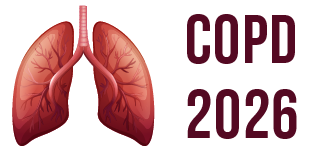3rd World Congress on
COPD and Pulmonary Diseases
September 09-10, 2026 | Barcelona, Spain

Address: Avinguda Del Maresme 78 Ronda De Dalt Exit 15, 08940 Comellà de Llobregat, Barcelona, Spain
COPD 2026

Gazi Medical College, Bangladesh
Abstract:
Tuberculosis (TB) is the second leading cause of death from a single infectious agent worldwide. Bangladesh ranks 7th among the 30 high TB burdened countries in the world. Accurate detection of Mycobacterium tuberculosis complex (MTBC) is challenging for developing countries as most of the resource-poor settings are not suitable for performing molecular techniques.
The purpose of the study was to compare the multiplex TB-LAMP assay with MTB/NTM qPCR, culture, Z-N staining, and fluorescence microscopy in order to assess the effectiveness of the LAMP assay for detecting cases of pulmonary tuberculosis.This research work was done from March 2022 to February 2023. Fulfilling the inclusion criteria 130 sputum samples were collected. TB-LAMP assay, qPCR, culture in L-J media, Z-N staining, and fluorescence microscopy were performed.
Out of 130 samples qPCR detected MTBC in 56.92 % cases, and TB-LAMP detected 53.85 %. MTBC was detected by culture 46.15 %, by Fluorescence microscopy 40.77 %, and Z-N staining 36.92 %. TB-LAMP detected 16.93 % more cases than Z-N staining and 13.08 % more cases than fluorescence microscopy. The sensitivity, specificity, positive, and negative predictive values of multiplex-LAMP assay were 95 %, 81.4 %, 81.4 %, and 95 %, respectively considering culture as a gold-standard. MTBC negative culture samples (18.57 %) showed positivity by LAMP assay as well as by qPCR. This study detected 7.69 % non-tuberculous mycobacteria (NTM) by qPCR. All NTM positive samples were negative by TB-LAMP.
TB-LAMP is an easy to perform, cost-effective, reliable assay with high sensitivity and specificity.
World Health Organization recommended TB-LAMP as a rapid molecular test for rapid detection of tuberculosis and as replacement of microscopy in resource poor settings/hard to reach areas. Bangladesh being a high TB burden country it is essential to implement TB-LAMP to achieve End TB Strategy by 2035.
Biography:
Md. Zaber currently serves as an Assistant Professor in the Department of Microbiology at Gazi Medical College, Khulna, Bangladesh. He obtained his MBBS degree from Mymensingh Medical College and subsequently earned his MD in Microbiology from Bangabandhu Sheikh Mujib Medical University (BSMMU), Dhaka. Dr. Zaber has over five years of research experience in the field of microbiology, complemented by two years of academic teaching. His research interests include the optimization of culture conditions for bacterial isolation, the application of molecular technologies for pathogen detection, and the analysis of antimicrobial resistance patterns. In addition, his work has contributed to the detection of cytokine levels for COVID-19 diagnosis, as well as the identification and differentiation of Mycobacterium tuberculosis and non-tuberculous mycobacteria. Through his academic and research contributions, Dr. Zaber remains committed to advancing knowledge in microbiology and strengthening diagnostic approaches for infectious diseases in Bangladesh.
